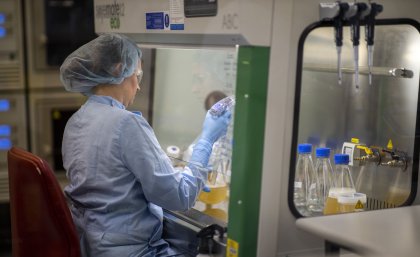
Pre-clinical testing of The University of Queensland’s COVID-19 vaccine has produced positive indications about its potential effectiveness and manufacturability.
Project co-leader Associate Professor Keith Chappell has reported to the International Society for Vaccines on data from animal trials conducted by Viroclinics-DDL in the Netherlands.
“The neutralizing immune response created by our molecular clamp vaccine in animal models was better than the average level of antibodies found in patients who have recovered from COVID-19,” Dr Chappell said.
“In hamster models, the vaccine combined with the Seqirus MF59® adjuvant, provided protection against virus replication, and reduced lung inflammation following exposure to the virus.
 “It also induces a strong T-cell response and showed strong results when it came to data relating to manufacturability.
“It also induces a strong T-cell response and showed strong results when it came to data relating to manufacturability.
“One of the big challenges in the development of vaccines is the ability to produce them at sufficient scale for widespread use,” Dr Chappell said.
“We are working with CSL to ensure the production yield is as efficient as possible, and have every confidence they will be able to manufacture the millions of doses required to protect the Australian public.
“The Phase 1 study being conducted in Queensland is progressing well and assuming the study demonstrates adequate safety and immune responses, data should be available in time for CSL to commence the required large-scale efficacy study before the end of the year.”
Queensland’s Innovation Minister Kate Jones said the results were a huge milestone in the development of a Queensland vaccine.
“A vaccine is vital in putting an end to this pandemic. That’s why the government has thrown its support behind UQ with $10 million in funding to fast-track this research,” Ms Jones said.
“The sooner we can produce a coronavirus vaccine, the sooner life will get back to normal for millions of Queenslanders who have been impacted by this pandemic.”
The UQ team became the first project in the world to report against a COVID-19 reference standard, produced by The National Institute for Biological Standards and Control (NIBSC) and recommended by the World Health Organization (WHO).
“From the outset we’ve been clear that we are racing against the virus and not against other projects, and now more than ever it is important for the scientific world to work together.
“At the moment it is not possible to compare the immune response between vaccines as different teams are using different assays and methods to test virus neutralisation.
“We hope that by sharing data and comparing it to an international reference standard we will inspire other teams to do the same.”
The Coalition for Epidemic Preparedness (CEPI) and UQ announced a partnership with CSL in June to rapidly advance production and move the program into later stage clinical testing, regulatory approval, large-scale manufacture and distribution if clinical trials prove successful. This clinical work was also conducted with TetraQ, Australian National University (ANU), the University of Melbourne and the Peter Doherty Institute for Infection and Immunity.
CEPI has provided $15.16m to develop UQ’s molecular clamp vaccine platform that enables rapid vaccine design and production.
The Queensland Government has provided $10 million Advance Queensland funding for the vaccine project, the Federal Government has contributed $5 million and more than $10 million has been provided by philanthropic and other donors.
The UQ team are preparing to submit their findings to a research journal for peer review and to be available pre-print.
Media: UQ Communication, communications@uq.edu.au, +61 429 056139.


